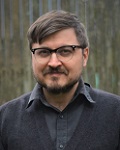2014, 2021
Darren T. Byler
- Assistant Professor
- Simon Fraser University

Abstract
"Following a series of riots in 2009, officials of Ürümchi, an ethnically-diverse border city in Northwest China, announced plans to resettle 250,000 minority inhabitants from “slums” to state-subsidized public housing and multi-million yuan investments in art projects across the city which address goals of "harmony" and "development." Routing my research through Uyghur and Han art collectives that have been created as supplements to urban renewal, this project will focus on the lived experience and cultural expression of cityscape revision. Aimed at the intersection of urban studies, expressive culture, minority and migration politics, it will consider how the lived experience of late-Socialist Chinese urban planning gives rise to new forms of sociality and aesthetics.
Abstract
Beginning in 2016, Chinese state authorities implemented a counter-terrorism law that placed hundreds of thousands of Uyghurs and other Muslim peoples in a "pre-criminal" category. This, in turn, led to their detainment and "reeducation" in internment camps. This research will show how the detainability of Muslims was produced through legal narratives and how this discursive frame and related surveillance infrastructures resulted in forms of state power and legal indeterminacy that produced patterns of experience for targeted populations. Drawing on approximately 100 interviews with former detainees and others who have recently fled from China as well as thousands of internal government documents, it probes beneath the banal everydayness of this discourse and material environment to consider the capacities humans have to refuse or denarrativize their existence, opening up space for thinking with violence.

